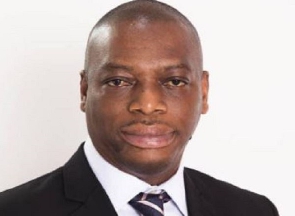Opinions of Saturday, 13 April 2013
Columnist: Cudjoe, Alfred B
When Honourable Arrogance and Greed Provoke Anger
By Dr Alfred B Cudjoe
The renowned African writer, Chinua Achebe, of blessed memory says no child can pay for its mother’s milk. This partly explains why our honourable members of parliament and government appointees’ decision to reward themselves so handsomely for their ‘sacrifices’ to their country will not only be seen by many as unreasonable but also unethical. The truth, they say, is like a cock; the more you force it under water, the more it bobs to the surface. Simply put, the more our ‘honourable gentlemen and women’ justify their self-reward the more their real intensions become apparent, thereby provoking the people’s anger.
Ghanaian local media headlines have been dominated for the past few days by a debate triggered by the payment of ex-gratia to members of parliament. According to press reports MPs who retained their membership of the House after the December 7, 2012 elections received GH¢276,000 each, while those who lost their seats were paid GH¢311,000 each. The report adds that currently, MPs are enjoying GH¢7, 600 in monthly salaries and have been granted a further GH¢50, 000 a year in housing allowances in a country where daily minimum wage is pegged at GH¢4.00.
What actually fuelled the heightening of tension is a comment by the former MP for Asokwa, Mr Kofi Jumah. The former honourable gentleman claimed that medical doctors, teachers and other professionals cannot compare themselves to MPs because MPs are on a higher pedestal compared to those professions. His comment was a reaction to public outcry about the payment of the ex-gratia and the fact that the government has failed to pay teachers’ and doctors’ salaries and allowances that are due them.
The government, in a statement issued by the Ministry of Information and Media Relations, condemned the comments by Mr Jumah, a former opposition MP. It is, however, interesting to observe that, in spite of the public anger that the issue is generating, all MPs are for once speaking almost with united voice in support of the payment. While some come out boldly to support it others issue statements which tacitly justify it. Thus, in reaction to comments on the timing of the payment, especially when government claims it is unable to pay some professionals due to lack of funds, the MP for Wa Central and Minister of State in charge of Private-Public Partnerships at the Presidency, Mr Rashid Pelpuo, contended that the timing would never be right because "there will be no end to labour agitations".
While not condemning the payment of such colossal amounts to MPs when the government complains of lack of funds, the Director of Communication for the New Patriotic Party (NPP), Nana Akomea, agrees that the timing of the payment is wrong. In his view, the government should have dealt with the numerous labour agitations for salary increases before paying such huge amounts to MPs. Faint Voices of Support Comments and statements made by some public officials, who are either non-partisan or are activists of political parties without any significant representation in parliament, appear to reflect the disappointment and anger of the ordinary Ghanaian. The Vice-President of IMANI Centre for Policy and Education, Mr Kofi Bentil, reportedly described the payment of the ex-gratia and other allowances as a “way the ruling class of our society loot the coffers of Ghana every four years”. For her part, the 2012 Vice Presidential Candidate of the CPP, Nana Akosua Frimponmaa, has been quoted as asking all eligible voters not to re-elect any MP back into Parliament until they decline the huge ex-gratia paid them at “this crucial time”.
The storm being created by the government’s ‘good gesture’ to the MPs is a reminder of the fact that the type of democracy being practised in Ghana and other third world countries can turn autocratic, with elected leaders easily becoming tyrants. It is a phenomenon that Shakespeare dramatizes in Coriolanus, the leaders taking the people’s interest for granted. Coriolanus, an army officer in the Shakespeare play, was reputed for his successes in wars but, unfortunately, he hated the people and out of his “noble carelessness” he let them see it. The point that the renowned playwright is trying to make here is that leaders have the tendency to deny the people the very power that the people have vested in them.
In Ghana, as current political developments demonstrate, politicians, mostly MPs, usually use the most humble means to seek power from the people but later turn their back to them. Mr Kofi Juma’s assertion that MPs are above doctors, teachers and other professionals and that they (MPs) deserve better conditions of service than them henceforth takes from the honourable gentlemen and women the humility which they need to serve the people. It renders meaningless the slogan that many political parties in the country use to convince the people: service to the people. Although many MPs would claim that the former Asokwa MP was not speaking for them their silence over the comment only amounts to consent and one could only imagine how most of them would be saying in their heads, “Yes, tell them. Those doctors don’t know that we’re more important than them?”
As the debate on the ex-gratia payment continues the real mentality of the MPs become more apparent. Indeed some of them even try to use the corrupt and illegal practices they use to woo voters as justification for the huge allowances they have approved for themselves. The former MP for Asikuma-Odobeng Brakwa, Mr Paul Collins Appiah Ofori, is quoted as claiming that "MPs pay the school fees, hospital bills, funeral bills among others for their constituents but if you refuse to foot these bills, they will vote massively against you". What Mr Appiah Ofori is implying by this claim is that constituents vote MPs back to power according to how much money or material things they use to influence them and not because of the amount of work they do. Ironically this is the very politician who claims to be leading a crusade against corruption. The Real Argument People who are neck deep in this debate sometimes lose their baring and veer off the real argument. One would therefore ask: What is it all about? Renowned journalist and known political commentator, Abdul Malik Kweku Baako Jnr, is quoted as saying “MPs need their ex-gratia [and] we must give it to them”. Indeed, nobody has said so far that MPs do not deserve to be paid ex-gratia and other entitlements due them. At least the media has so far not reported any such opposition. However, as Mr Baako Jnr also admits, people have “played political football with [the issue] so it’s become difficult.”
Members of Parliament, whether past or present, for all the high position and knowledge they claim they have are clearly missing the point in the people’s anger. It is becoming a trend in Ghanaian politics that whenever elections are approaching, politicians lure voters with sweet words to elect them into parliament. Once they obtain their mandate they acquire honourable arrogance and impunity which, unfortunately, distance them from electoral promises they made with all the humility they could command. When a typical Ghanaian politician becomes power drunk, they can afford to step on the electorate or use the country’s resources anyhow and nobody dares complain.
A critical analysis of contemporary politics in Ghana reveals a trend which betrays the image that politicians are carving for themselves. As in Shakespeare’s Coriolanus, politicians want the people’s vote but they hate everything about their welfare and out of their honourable carelessness they let the people see it. Otherwise, what else would explain the fact the government is unable to provide portable water, electricity and basic health for the people due to lack of funds? The self-same government is able to provide funds to be used to pay colossal benefits and allowance to MPs for their ‘sacrifices’ to the people who elected them. The explanation that part of the colossal ex-gratia will be used to ‘reward’ the electorate for their vote is an insult to people whose toil generated the funds.
The ex-gratia debate is also just a tip of the ice-berg when one considers some developments that usually characterise election campaigns in the country. The resources and efforts that politicians now put into these campaigns every four years are becoming so great that one can see how their very existence depends on them. Primaries have become inter-party battle grounds where aspiring parliamentary candidates use fair or foul means to get the nod of voters to enter parliament. Once there, they try to recoup whatever resources they put in the fight and then go on to acquire their own wealth. The promise of dying a little for the people becomes an empty slogan, a cliché.
Come to think of it that the only significant achievement of the Mahama-led administration since January appears to be this ex-gratia payment. With some of the country’s roads so bad leading to accidents that kill and maim travellers, power cuts so rampant, portable water becoming so scarce and expensive, and the lack of many basic facilities, one would have expected MPs and government appointees to show some concern. Of course, it is difficult for them to do so when they are so preoccupied with their own welfare. It is unfortunate that some MPs and former MPs, in justifying the payment of the ex-gratia and other allowances to them, failed to see the other side of the coin.
The former MP for Dome-Kwabenya Constituency, Professor Mike Oquaye, is one of the public figures who justify not only the payment of the ex-gratia but also the amount involved. He, however, calls for a proper discussion of the issue in view of the concerns expressed by people. One would, however, dare to add that MPs and the government have erred in the way they created the crisis and how they are managing it. There is a local adage on the sharing of slices of yam. When you take one slice, allow your neighbour to also take one before you take the second. It is shear greed that convinces someone to see the justification in taking several slices when their neighbours are also hungry and waiting for their turn.












